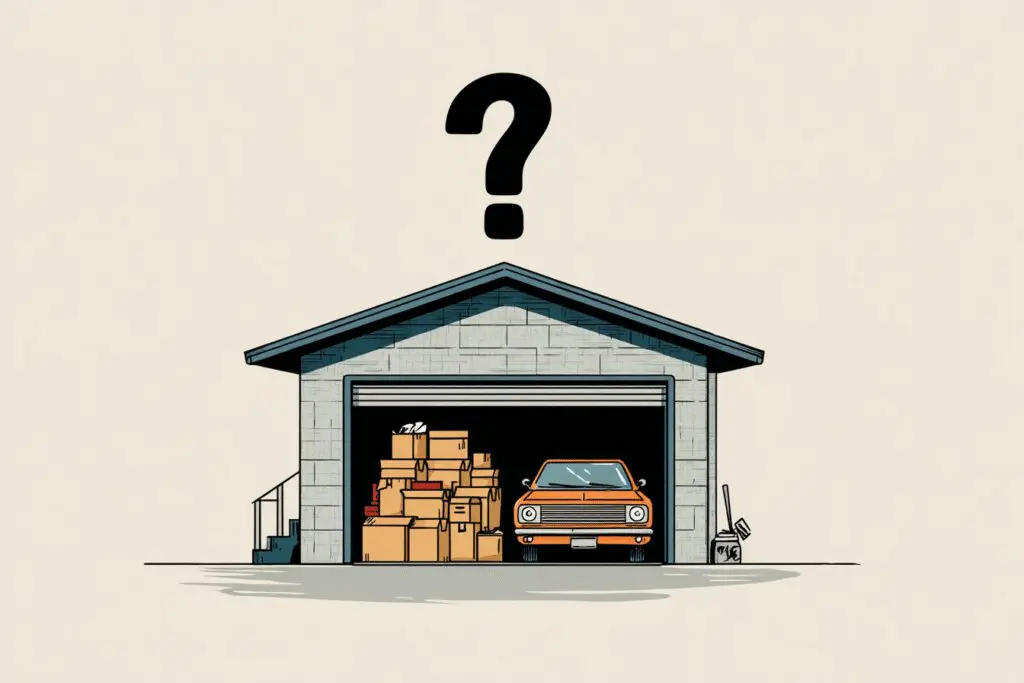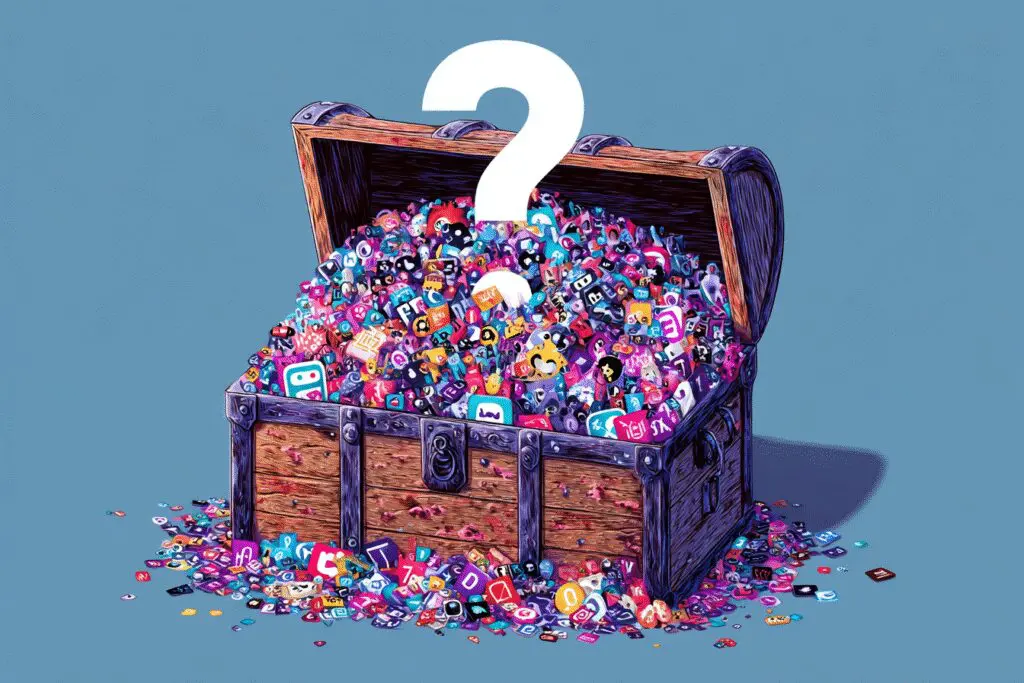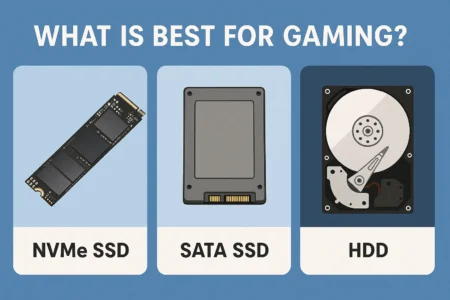Did you know that a single video game, with all its updates, can now consume more digital space than the entire Windows 11 operating system? It’s a wild thought, but it perfectly captures the dilemma facing gamers today. You’ve got your new PC or console, and you’re staring at that storage number: 1 Terabyte. A few years ago, that would have sounded like an infinite library. Today, the big question is, is 1TB enough for gaming?
The short answer is: yes, but with a big asterisk. For a casual gamer, 1TB is a perfectly comfortable space to live in. However, for a dedicated enthusiast who loves jumping between massive AAA titles, a 1TB drive is less of a permanent mansion and more of a functional, but sometimes cramped, apartment. It’s manageable, but you’re going to have to get good at digital housekeeping.
This guide will break down exactly what that means. We’ll dive into why games have become so massive, how much space you actually have to work with, and most importantly, how to make that terabyte work for you without constantly seeing that dreaded “Storage Full” notification.
More in Motherboards & Storage Category
How to Tell If Motherboard Is Dead
How to Update Motherboard Drivers
Why Are Modern Game Sizes Exploding So Rapidly?
It feels like every new blockbuster release comes with a jaw-dropping storage requirement. I remember installing Call of Duty: Modern Warfare back in 2019 and being genuinely shocked when it devoured nearly 200GB. My once-spacious 500GB SSD suddenly felt claustrophobic. This trend hasn’t slowed down, and there are some very clear reasons why these games are such data hogs.
How Much Space Do High-Resolution Textures and 4K Assets Truly Take?
The biggest culprit behind ballooning game sizes is the push for photorealistic graphics. As our monitors and TVs have moved to 4K resolution, the assets within games have had to scale up dramatically to look sharp.
Think of a texture as the “skin” that wraps around a 3D model, like the brick on a wall or the fabric on a character’s clothing. A standard-definition texture might be a small image file. A 4K texture, however, is a massive, incredibly detailed image. Now, multiply that by the thousands of unique textures needed to build a vast open world like in Cyberpunk 2077 or Red Dead Redemption 2.
Furthermore, it’s not just the visuals. Uncompressed audio files, which provide richer and more immersive soundscapes, also take up a significant amount of space. Every line of dialogue, every gunshot, and every subtle ambient noise adds to the total. Consequently, the combination of ultra-high-resolution assets and crystal-clear audio is the primary driver behind modern game bloat.
Do Post-Launch DLCs and Constant Updates Contribute to the Bloat?
Absolutely. The initial download is often just the beginning. For live-service games like Destiny 2 or Fortnite, the game you install today is vastly different—and larger—than the one that launched years ago.
This happens for a few key reasons:
- New Content: Every new season, expansion, or event adds maps, characters, weapons, and story missions. Each of these additions brings its own set of assets, code, and audio, incrementally increasing the game’s footprint.
- Patches and Fixes: While some patches optimize data and can even slightly reduce file size, many others add new data without removing the old, leading to a net increase in size over time.
- Lack of Optimization: Sometimes, developers prioritize pushing out new content quickly over meticulously optimizing storage. This can lead to redundant files or inefficient data packing, causing the game’s size to swell more than necessary.
I once had Destiny 2 installed for over two years, and I watched its folder size grow by nearly 50GB through its various expansions. It’s a slow creep, but it makes a huge difference over the life of a game you love.
So, How Much Space Do You Actually Have on a 1TB Drive?
Here’s the first bit of frustrating news for anyone new to storage: a 1TB drive does not give you 1,000 gigabytes of usable space. Due to the way manufacturers market storage versus how operating systems calculate it, a 1TB drive typically shows up as around 931GB of actual, usable space.
That’s our starting point. From there, we have to start carving out room for the essentials before a single game is even installed.
How Much Room Does Your Operating System Need to Breathe?
Your operating system is the foundation of your gaming rig, and it needs its own dedicated space. A fresh installation of Windows 11 might only take up around 25-30GB. However, that’s not the full story.
The OS needs extra room for:
- Updates: Windows downloads and installs significant updates, which require temporary space and increase the overall system footprint.
- System Restore Points: These are backups that let you roll back your system, but they can take up several gigabytes.
- Virtual Memory (Page File): Windows uses a portion of your drive as a temporary form of RAM, which can be anywhere from a few gigabytes to over 16GB.
- Hibernation File: If you use the hibernate feature, a file equal to the size of your RAM is created on the drive.
Realistically, you should budget between 60GB and 100GB just for Windows to operate comfortably. Suddenly, our 931GB is down to about 850GB.
What About All of Your Essential Software and Applications?
You don’t just use your computer for gaming. You need a host of other applications to support your hobby and for daily use. Think about it:
- Game Launchers: Steam, Epic Games Store, GOG Galaxy, EA App. They don’t take up much space themselves, but their caches can grow.
- Communication: Discord is essential for talking with friends, but its cache can swell over time.
- Streaming/Recording: If you use software like OBS Studio or NVIDIA ShadowPlay, you need space for the programs and, more importantly, for your recordings.
- General Utilities: A web browser like Chrome, creative software like Photoshop, and other tools all nibble away at your storage.
It’s safe to assume another 20-50GB will be consumed by these essential applications. This leaves us with a realistic gaming library space of around 800GB. This is the number we need to work with.
Let’s Break Down the Numbers: How Many Games Can You Fit on 1TB?
With our ~800GB of usable gaming space, the question becomes one of simple math. The answer depends entirely on your taste in games. Are you a AAA blockbuster enthusiast, an indie connoisseur, or a mix of both?
What Are the Biggest AAA Games Demanding Today?
This is where a 1TB drive starts to feel the pressure. The biggest, most graphically intensive games are absolute storage monsters. Installing just a handful of these can max out your drive.
Here’s a look at some popular titles and their approximate install sizes (including updates):
- Call of Duty (Warzone/MWIII): Often exceeds 200GB.
- Baldur’s Gate 3: Sits comfortably around 150GB.
- Starfield: Requires about 125GB of space.
- Cyberpunk 2077 (with Phantom Liberty): Climbs to over 100GB.
- ARK: Survival Evolved (with all DLCs): Can ridiculously surpass 400GB!
Doing the math, if you install Call of Duty and Baldur’s Gate 3, you’ve already used up nearly half of your available gaming space. Add Starfield and Cyberpunk, and your 1TB drive is officially full. You can realistically keep about 4 to 6 massive AAA games installed at once.
How Do Popular Live-Service and Multiplayer Games Stack Up?
Fortunately, not every popular game is a 150GB behemoth. Many of the most-played multiplayer titles are more considerate of your storage, though they are still substantial.
For instance:
- Apex Legends: Around 70-80GB.
- Fortnite: A surprisingly lean 30-40GB, though it fluctuates.
- Valorant: Stays under 30GB.
- Genshin Impact: Can take up over 70GB on PC.
- Destiny 2: Hovers around the 100GB mark.
You can create a very healthy library with these. On an 800GB drive, you could easily install Apex, Fortnite, Valorant, and Destiny 2 and still have over half your space left for other titles.
What About the Wonderful World of Indie Games?
This is where a 1TB drive becomes a paradise. Indie games typically prioritize unique gameplay mechanics and art styles over cutting-edge, photorealistic graphics. Because of this, their file sizes are a tiny fraction of their AAA counterparts.
- Hades: ~15GB
- Stardew Valley: ~1GB
- Hollow Knight: ~9GB
- Celeste: ~1.2GB
You could install hundreds of incredible indie games on a 1TB drive without breaking a sweat. For a gamer who loves variety and isn’t solely focused on the latest graphical showcases, 1TB offers a massive amount of freedom. A healthy mix might be two AAA titles, three or four multiplayer games, and a dozen indies, which fits perfectly within the 1TB limit.
Is 1TB a Good Choice for a PlayStation 5 or Xbox Series X?
The storage conversation is just as critical on consoles. In fact, it might be even more important because of their fixed internal storage and proprietary expansion options.
The PlayStation 5 advertises 825GB of storage, but after the OS, you’re left with only about 667GB of usable space. The Xbox Series X offers 1TB, but that translates to about 802GB for your games. Right away, you can see that the console experience starts you off with less room than a 1TB PC drive.
With game sizes being identical, or sometimes even larger, on consoles, that 667GB on a PS5 can disappear alarmingly fast. Installing just Call of Duty, Baldur’s Gate 3, and Horizon Forbidden West would fill it to the brim.
For this reason, 1TB is truly the absolute minimum for a current-generation console owner. Most dedicated console gamers will find themselves needing to buy an expansion card or an external drive within the first year.
How Can You Effectively Manage Your 1TB of Gaming Storage?
Living with a 1TB drive doesn’t have to be a constant struggle. With a few smart habits and tools, you can make it a perfectly pleasant experience. It just requires a little more active management.
Are You Regularly Cleaning Out Games You’ve Finished or Don’t Play?
This is the most important habit to develop. Be honest with yourself. Are you really going to jump back into that 150GB single-player epic you finished three months ago? Maybe, but probably not right now.
I had to finally say a temporary goodbye to Red Dead Redemption 2. It was a tough breakup, I loved roaming that world. But I needed the 150GB for new adventures. Uninstalling games you aren’t actively playing is the fastest way to free up massive chunks of space. Both Steam and modern consoles have storage management tools that show you which games are taking up the most space, making it easy to decide what to cut.
Could an External HDD Be a Smart “Cold Storage” Solution?
What if you don’t want to re-download a 100GB game every time you get the urge to play it? A great solution is to use a large, inexpensive external Hard Disk Drive (HDD) as “cold storage.”
Here’s the process:
- Move the installed game files from your fast internal SSD to the external HDD.
- This frees up space on your main drive for new games.
- When you want to play the old game again, simply transfer the files back.
This is much, much faster than downloading the entire game again, especially if your internet connection isn’t lightning-fast. It’s the perfect compromise between having a game accessible and keeping your primary drive lean.
What About Embracing Cloud Gaming Services?
Cloud gaming platforms like NVIDIA GeForce Now and Xbox Cloud Gaming offer a fascinating alternative. These services let you stream games from powerful remote servers directly to your screen.
The beauty of this is that the game is never actually installed on your drive. You can play the most demanding AAA titles without using a single gigabyte of local storage. While it requires a strong and stable internet connection, using a cloud service to supplement your library is a fantastic way to try new games or play massive titles without committing the hard drive space.
What Does the Future Hold for Game Sizes and Storage Needs?
Looking ahead, the trend of growing game sizes is unlikely to reverse. As developers create even more complex and visually stunning worlds, the storage requirements will continue to climb. After digging through tech forums and even looking at what university game design programs like the one at Purdue University are teaching, it’s clear that the creation of high-fidelity assets is a major focus of modern development.
While new compression technologies will help mitigate the issue, they are fighting a difficult battle against the sheer scale of next-generation games. For this reason, what is considered the “minimum” today will likely be insufficient in a few years.
The Final Verdict: Is 1TB Really Enough?
Yes, 1TB is a perfectly viable and functional starting point. You can have a fantastic gaming experience with a 1TB drive, especially if you play a lot of indie games, focus on one or two multiplayer titles, and are diligent about uninstalling games you’re no longer playing.
However, if you’re a hardcore gamer who wants instant access to a large library of massive AAA blockbusters without the hassle of constant storage management, 1TB will feel restrictive. You will spend time shuffling files, uninstalling old favorites, and waiting for new installations.
My honest advice is this: If you are building or buying a new gaming PC today, make a 2TB SSD your target. The price difference has become much smaller, and the quality-of-life improvement is immense. It moves you from “managing” your library to simply “enjoying” it. But if your budget only allows for 1TB, don’t worry. It is absolutely enough to have a great time—you’ll just become very familiar with the uninstall button.
Frequently Asked Questions – Is 1TB Enough for Gaming

Can using cloud gaming services help save storage space on a 1TB drive?
Yes, cloud gaming services stream games directly from remote servers, eliminating the need to install large game files locally, which helps save significant storage space if you have a fast and stable internet connection.
What are the best options to manage limited storage on a gaming PC with only 1TB?
Effective strategies include deleting finished or unused games, managing mods, performing regular disk cleanup, using storage analysis tools, and considering additional drives, such as an extra SSD, to expand your storage capacity.
How big are popular modern games like Call of Duty, Baldur’s Gate 3, and Starfield?
Popular modern games can range from around 120 GB for games like Starfield and Cyberpunk 2077 to over 250 GB for Call of Duty series, with some games like ARK surpassing 400 GB when including all DLCs.
What makes modern video games so large in size?
Modern games are large because they include high-resolution textures, detailed audio files, expansive game worlds, high-quality cutscenes, and frequent updates and DLCs, all of which increase file size.
Is 1TB of storage enough for gaming in 2025 and beyond?
Whether 1TB is enough depends on your gaming habits. Casual gamers with a few favorite games will likely find 1TB sufficient, but hardcore gamers with many large games may need more storage.





